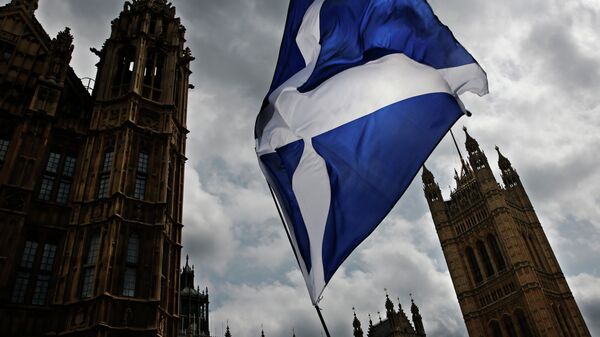On Thursday, Scottish First Minister Nicola Sturgeon reiterated a pledge to publish for consultation a draft bill proposing a second referendum on Scottish independence, amid growing uncertainty about the future of the UK following the Brexit referendum vote.
Sturgeon is leader of the Scottish National Party, which campaigns for Scottish independence. The party won 56 out of Scotland's 59 UK parliamentary seats during the UK's last general election in 2015. In 2014 Scotland held a referendum on independence, in which 55.3 percent of voters voted to remain in the UK.
John Curtice, Professor of Politics at Strathclyde University and President of the British Polling Council, told Radio Sputnik that the draft bill is not yet intended for debate in the Scottish Parliament.
However, if Sturgeon's devolved Scottish government does not receive the Brexit deal it wants, the Scottish First Minister may hold another independence referendum, and even win it.
"The Scottish government is very keen that Scotland should remain part of the single market, whereas at the moment at least, the mood music from London is that perhaps we won't be. Certainly, in part, she (Sturgeon) is wanting to push the UK government to come up with a settlement for the UK as a whole that's closer to what Scotland would prefer," Curtice said.
"She's also looking ways in which Scotland might have a different relationship with the EU when the UK leaves, but still remain part of the UK."
A crucial part of Sturgeon's strategy to obtain a second independence referendum is to lay out Scottish demands for Britain's Brexit negotiating stance, and trigger a second referendum if those demands are not met.
"While the polls at the moment suggest a narrow majority for staying inside the UK, it is no more than a small majority, so therefore Ms. Sturgeon's threat is by no means an empty one," Curtice said.
If Scotland were to hold a referendum before the UK leaves the EU, it could potentially remain in the bloc as a continuing member. However, achieving independence after the UK has left the EU would force Scotland to apply as an entirely new member.
"That does mean that there's a certain amount of pressure on her, certainly to hold a referendum within around 12 months or so, if she's going to hold one," since the UK is facing a two-year exit process.
"The difficulty is, however, that it's by no means clear that we will even have some idea of the shape of what the negotiations between the EU and UK are going to look like by that time and indeed, whether we are going to be outside the single market, which particularly seems to be Nicola Sturgeon's bottom line," Curtice said.
"UK governments have been on the record for over 20 years now, and it was confirmed by the attitude of the UK government towards the referendum in 2014, that Scotland, having in effect voluntarily joined the UK in through the Act of Union in 1707, does have the right to leave the UK at some point should it wish to do so."




